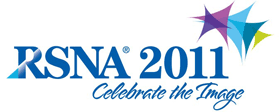
Abstract Archives of the RSNA, 2011
SSK18-02
Sequence-dependent Radiosensitization of Non-Small Cell Lung Cancer EGFR Mutants by Tyrosine Kinase Inhibitors
Scientific Formal (Paper) Presentations
Presented on November 30, 2011
Presented as part of SSK18: Radiation Oncology and Radiobiology (Lung)
Kathryn Huber MD, PhD, Presenter: Nothing to Disclose
Wade E Huber MS, Abstract Co-Author: Nothing to Disclose
Eric J Pier BS, Abstract Co-Author: Nothing to Disclose
David E Wazer MD, Abstract Co-Author: Nothing to Disclose
Non-small cell lung cancer (NSCLC) harboring an activating mutation in EGFR are highly sensitive to tyrosine kinase inhibitors (TKI). In addition, these cells are sensitive to radiation (RT) as they lack RT induced G1 cell cycle checkpoint control, failing to halt DNA synthesis in response to DNA damage. In contrast, the antiproliferative effect of TKIs causes G1 cell cycle arrest, which if induced prior to RT, could result in paradoxical radioprotection. We investigated EGFR mutant cell survival following TKI and RT and how the timing of TKI delivery affects radioresponse.
Cell survival was measured by colony formation assays that were performed on untreated cells (control-Group 1) or cells treated with 1 μM of the TKI gefitinib added either for 24 h post-RT (Group 2), for 24 h pre-RT (Group 3), or for 24 h pre- and post-RT (Group 4). Flow cytometry was used determine the effect of TKI and RT on cell cycle progression and arrest of DNA synthesis was confirmed by measuring BrdU incorporation. These assays were performed in both EGFR mutant and wild-type NSCLC cell lines. Apoptotic cell death was measured following these treatments by Annexin V analysis.
Gefitinib treatment for 24 h post-RT leads to 30% further reduction in survival fraction after 2 Gy (SF2) compared to control or pre-treated cells in EGFR mutant cell line, HCC4006 (SF2 Group 1: 0.75+/-0.05; Group 2: 0.54+/-0.03; Group 3: 0.89+/-0.01; Group 4: 0.98+/-0.24). There was no significant difference in SF2 among the groups for EGFR wild type NSCLC cell line, A549. BrdU incorporation was reduced in Groups 3 and 4 (~3% labeled cells) compared to untreated Group 1 or post-RT treated Group 2 (~20%) following 2 Gy of radiation. AnnexinV staining showed an increase in apoptosis in all groups following RT, with the exception of Group 3, pre-treated with TKI prior to RT.
This study demonstrates that there can be a strong radiosensitizing effect of TKIs for EGFR mutant NSCLC cells if it is delivered after RT, but that this effect is negated if it is administered prior to RT. This effect may be, at least partially due to inhibition of DNA synthesis by TKIs. Finally pre-treatment of EGFR mutant cells causes inhibition of RT induced apoptosis.
Clinical trials using combined RT and TKIs to treat NSCLC have been disappointing: however, either short-acting EGFR inhibition post-RT or sequential therapy may prove beneficial.
Huber, K,
Huber, W,
Pier, E,
Wazer, D,
Sequence-dependent Radiosensitization of Non-Small Cell Lung Cancer EGFR Mutants by Tyrosine Kinase Inhibitors. Radiological Society of North America 2011 Scientific Assembly and Annual Meeting, November 26 - December 2, 2011 ,Chicago IL.
http://archive.rsna.org/2011/11003810.html

